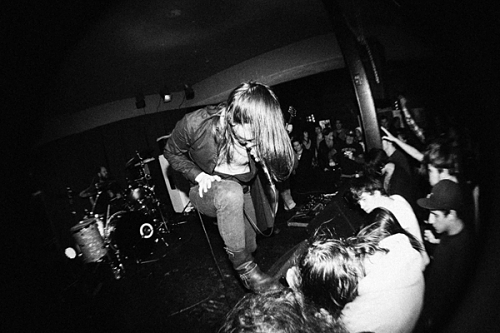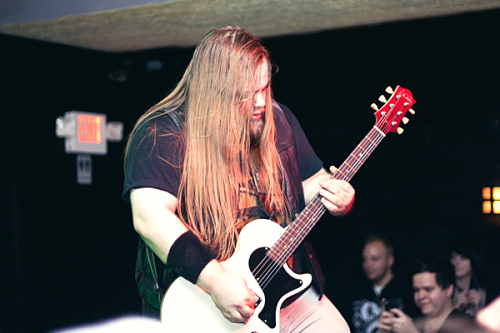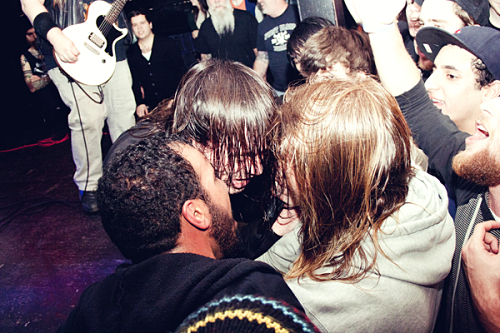
Introducing cover songs into your repertoire is no easy task thanks to the daunting responsibility of a) upholding the original artist’s creative talents and b) performing in such a way the material rocks faces off and doesn’t put you to sleep. In the past month, CANCER BATS have succeeded living up to the iconic name Black Sabbath. But as vocalist Liam Cormier and bassist Jaye Schwarzer told us before their recent gig in Ottawa, there’s a lot more to covers than you think as they’re a specific influence to new recordings, performing and an individual’s personality.
You kicked off your Bat Sabbath tour last week in Toronto. How has the reaction been so far now that you’ve played a few dates in different cities across Ontario?
LIAM CORMIER: The Toronto show specifically was insane. It was kind of like our hometown show; obviously lots of friends and we were playing at a friend’s bar so it was sold out in half an hour. People drinking excessively..
JAYE SCHWARZER: Throwing the remnants of their drinks at us while we played – like a true cover show.
CORMIER: Yeah, it was really rowdy. It was really fun though. It was a good way of kind of getting our feet wet for the whole thing. Playing Sonisphere Festival to a bunch of British people who all knew the words and are singing along and going crazy, and then to come to Toronto where everyone knows the words and are going crazy, it was like.. “Ok, this was a good idea. It’s going to be awesome”. We then went to Collingwood, and had a blast there and then to Barrie last night and had a blast there too. So far it’s been really good.
How did the idea for the tour come about?
CORMIER: Well, the idea for the covers was actually from Sonisphere Festival. They wanted to do an after-party show on the tent stage after Slipknot played the main stage, so they asked us to do a cover set because we had played earlier that afternoon. So we learned all the songs and we played it and it was awesome. But then this tour, I will actually credit the idea to Shawn Scallen (local Ottawa promoter). He was the first person who was like “We should do this, this would be a fun show”, but he was just thinking about Ottawa.
But then someone in Kingston found out and was like “I heard you guys are doing an Ottawa show, I want to do a Kingston show”, and then they did the same in Montreal, so it kind of just kept going through word of mouth that way. It was always kind of fun because the idea was like “Okay, well why don’t we do it on these days?”, which were all the days that everyone had free. It’s fun for us because we just finished recording the new record, so we can’t go on tour. We sort of have to keep Cancer Bats things wrapped up, but this is sort of like a fun way to still tour anyway. And we know all the promoters and so we only have to hang out when we’re touring.
SCHWARZER: Instead of us finishing the record and being like “Ugh, now what?”, until Christmas, this was a good way to have fun and keep busy.
CORMIER: This takes up a little block of our time before we get too OCD about touring and doing nothing. And what I like about it is that the whole thing wasn’t a business move as much as it was just a fun idea to do, and all the shows have felt that way too. All the promoters are like “Man, I don’t care. It’s just going to be a fun night”. And actually, last night, we had kids showing up who didn’t even know who Cancer Bats were, they were just showing up because they love Black Sabbath. That rules!
“I think the big thing is the realization we’re always going to be Cancer Bats. And from looking at Black Sabbath, we realized that even though they are four people, none of them are doing the same thing at the exact same time. None of it lines up at any point but it all works so well..”
You guys are known for paying tribute to bands either by doing covers, such as yours of “Sabotage” by the Beastie Boys, or by offering guest spots on your albums. How much of an influence is the music you listen to?
CORMIER: I would say its huge. Especially even in hindsight, doing this Black Sabbath tour.. like learning those covers before we went and wrote the record, and then seeing how much that actually influenced our new album and how much it kind of expanded on a bunch of ideas that we were already working with. But for us it’s all about the scene and the community that we’re in too. I mean we’re not friends with anyone in Black Sabbath, but the whole idea of having our friends come and sing on our record – people that we’ve been influenced by – is big. Like Dez Fafara from DevilDriver sings on the new record, and I wouldn’t have thought that he would become a really good friend when we started this band.
It was a weird idea, because we’re two different worlds, but we met on tour and got along super well, and then I realized how similar someone like that is and how much that effected the songwriting. Just as much as having Wade from Alexisonfire or Tim from Rise Against where it makes sense in our context, it’s the same sort of thing. And also, on the same song that Dez sings on, we also have Kate Cooper from An Horse; again another unexpected guest. You’d never think that we’d be friends with an Australian pop singer, but we all have this common existence that makes sense and it really related to the song.
Having touched on this, how is the new record shaping up?
CORMIER: We just finished a couple weeks ago – it would have been done for a week by the time we did the Parts & Labour show in Toronto. Two days after it was complete we drove to Pittsburgh and played with Anti-Flag for a fun Thanksgiving show and then came back and learned the rest of the songs for this Bat Sabbath set to fill it out. We’re going to get it mastered next week, and then there’s all the fun business stuff that’s starting to take shape now.

With a few guests, can we expect any changes to the group’s sound?
CORMIER: I think sound-wise there’s definitely more of the natural evolution of how gnarly we keep getting and how more refined everyone sounds. I’d say the majority of our fans now have seen our band live and know how gnarly and ferocious it is, so trying to compress that into a recording still is kind of difficult. Like we’d say “I thought we did it pretty well on Bears”, and then we’d re-examine it and see there’s still some elements that are missing.
SCHWARZER: But there’s always stuff that comes up with every record, like what haven’t we really captured yet. With doing the Sabbath covers at Sonisphere and then going into writing this one and thinking about how they had written their songs, we tried to apply some of that into what we’re doing. Different elements are always going to come up when recording a new record. We’d always ask ourselves “What haven’t we done?” and “How can I make this better?” and doing that made it way more interesting.
CORMIER: I think the big thing too is the realization that we’re always going to be Cancer Bats. And from looking at Black Sabbath, we realized that even though Black Sabbath are these four guys, none of them are doing the same thing at the exact same time. Like none of it lines up at any point but it all works so well, to the point where you don’t even notice it. That was a big thing. We used to feel that all the parts playing along together would sound tighter, but now we’ve found that everyone confidently playing their own part makes the whole thing sound tighter and more cohesive. On this album, nothing sits on top of anything because it’s all got its own distinct voice.
SCHWARZER: I think having the confidence to try different things, but know that ultimately the end product is always going to be a Cancer Bats record is important. That’s never going to change; it’s never going to stray too far outside of its norm.
CORMIER: We’re at the point where we’ve realized whatever we do is going to be Cancer Bats because we already do so much weird shit anyway. So if we were to do a jazz record, it would still be a Cancer Bats record (laughs).

I guess knowing Black Sabbath is a band that’s had staying power for decades, it’d be cool to look at the way they were writing and recording.
CORMIER: Yeah, especially when we really put it under a microscope – like how we thought we knew what Black Sabbath was – we realized when you pull it apart, you don’t really grasp how complex it is and how much they’re really doing. Not that we’re experts now by any means, but it’s kind of like how you say it’s just classic rock but don’t see it’s really progressive. It’s really weird.
SCHWARZER: There’s a lot of jazz and blues going on and you don’t really think of it that way at all because it doesn’t sound like it.
You guys have had spots on festivals across the world, including Bluesfest this past summer, and you’ve even received a Juno Awards nomination. When you first started, did you ever think this would all be possible?
CORMIER: No. We just wanted to play shows when we were making our first demos. We only thought about just going on tour. And even still, when we work on anything, to get recognized from something like the Junos, or the Kerrang! Awards or any of that stuff, it’s all really cool, but you don’t try and put yourself in the mindset of the judges at those events. You still put your mindset in terms of your band and who loves your band and how much you love your band. It is rad to be recognized by other people because it’s almost like when you’re so focused on the project, you have someone really far removed from it say “No, I think you’re doing a good job”. Our thoughts are “Oh, cool. We thought we were just sleeping in a van in a parking lot” (laughs).
[Like this interview? Find more music news and videos from us on Twitter]